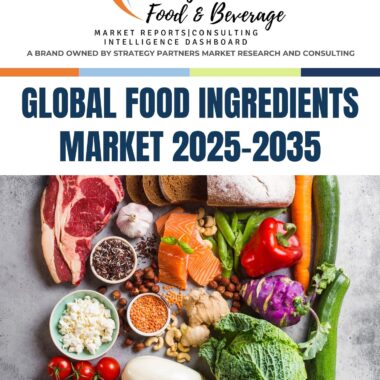Description
Global Culinary sauces market is used to add flavor, moisture, and texture to food. Culinary sauces can be made from a variety of ingredients, such as tomatoes, fruits, vegetables, herbs, and spices. Culinary sauces can be used as a condiment or as an ingredient in cooked dishes.
The key trends driving the growth of the global culinary sauces market include:
Increasing demand for culinary sauces from the food and beverage industry: The food and beverage industry is the largest consumer of culinary sauces. Culinary sauces are used in a variety of food and beverage products, such as pizzas, pastas, soups, and salad dressings. The growing demand for processed food and beverage products is driving the demand for culinary sauces.
Growing awareness of the health benefits of culinary sauces:
Culinary sauces have a number of health benefits. Culinary sauces are a good source of vitamins, minerals, and antioxidants. Culinary sauces can also help to reduce the risk of chronic diseases, such as heart disease and cancer. The growing awareness of the health benefits of culinary sauces is driving the demand for culinary sauces.
Rising disposable incomes in developing countries:
The rising disposable incomes in developing countries are leading to increased demand for culinary sauces. Consumers in developing countries are increasingly demanding high-quality and nutritious food and beverage products. Consumers in developing countries are also increasingly demanding personal care products and pharmaceuticals that are made with natural ingredients. The rising disposable incomes in developing countries are driving the demand for culinary sauces.
The key product segments in the global culinary sauces market include:
Tomato-based sauces: Tomato-based sauces are the largest product segment in the global culinary sauces market growth. Tomato-based sauces are made from tomatoes and other ingredients, such as herbs, spices, and vegetables. Tomato-based sauces are a popular choice for consumers who are looking for a flavorful and versatile sauce.
Mayonnaise-based sauces: Mayonnaise-based sauces are the second largest product segment in the global culinary sauces market trends. Mayonnaise-based sauces are made from mayonnaise and other ingredients, such as herbs, spices, and vegetables. Mayonnaise-based sauces are a popular choice for consumers who are looking for a creamy and flavorful sauce.
Vinaigrette-based sauces: Vinaigrette-based sauces are the third largest product segment in the global culinary sauces market analysis. Vinaigrette-based sauces are made from vinegar and oil and other ingredients, such as herbs, spices, and vegetables. Vinaigrette-based sauces are a popular choice for consumers who are looking for a light and flavorful sauce.
The key distribution channels in the global culinary sauces market include:
Direct sales: Direct sales are the largest distribution channel for culinary sauces. Direct sales involve manufacturers selling culinary sauces directly to food and beverage companies, retailers, and other industrial users.
Distributors: Distributors are another important distribution channel for culinary sauces. Distributors purchase culinary sauces from manufacturers and sell it to food and beverage companies, retailers, and other industrial users.
Online retailers: Online retailers are also becoming an important distribution channel for culinary sauces. Online retailers sell culinary sauces to food and beverage companies, retailers, other industrial users, and directly to consumers.
The key challenges facing the global culinary sauces market include:
Regulatory challenges: The regulation of culinary sauces varies from country to country. This can make it difficult for culinary sauces manufacturers to market their products globally.
Health concerns: There have been some concerns about the health risks of culinary sauces, particularly when they are consumed in high quantities. These concerns have led to increased scrutiny of the culinary sauces industry.
Lack of awareness of culinary sauces: Some consumers are not aware of culinary sauces or the health benefits they offer. This can make it difficult for culinary sauces manufacturers to market their products to consumers.
Despite the challenges, the global culinary sauces market is expected to continue to grow in the coming years. This is due to the increasing demand for culinary sauces from the food and beverage industry, the growing awareness of the health benefits of culinary sauces, and the rising disposable incomes in developing countries.
Here are some additional thoughts on the global culinary sauces market:
The Global Culinary sauces market forecast for organic and natural culinary sauces is growing rapidly. This is due to the increasing demand for organic and natural food products.
The Global Culinary sauces market report for culinary sauces in developing countries is expected to grow significantly in the coming years. This is due to the rising disposable incomes and the growing awareness of the health benefits of culinary sauces in developing countries.
Table of Content
1 Market Introduction- Global Culinary Sauces Market
1.1 Market Segmentation- Global Culinary Sauces Market
1.2 Key Trends- Global Culinary Sauces Market
1.2.1 Drivers
1.2.2 Restraints
1.2.3 Challenges
2 Global Market Forecast- Global Culinary Sauces Market
1. By Region
2. By Product
3. By Packaging
4. By Application
5. By Distribution Channel
3 Country Wise Forecast- Global Culinary Sauces Market
3.1 US
3.1.1 Key Trends
3.1.2 Consumer Spending
o Population
o GDP
o CPI
o Spend per Capita
o Spend as a proportion of GDP
3.1.3 Market Forecast- US Culinary Sauces Market
1. By Product
2. By Packaging
3. By Application
4. By Distribution Channel
3.1.4 Key Competitors- US Culinary Sauces Market
3.1.5 EXIM
3.1.6 Patents
3.1.7 Scenario Analysis- US Culinary Sauces Market
3.1.8 Opportunity Analysis- US Culinary Sauces Market
3.2 Canada
3.2.1 Key Trends
3.2.2 Consumer Spending
o Population
o GDP
o CPI
o Spend per Capita
o Spend as a proportion of GDP
3.2.3 Market Forecast- Canada Culinary Sauces Market
1.By Product
2.By Packaging
3.By Application
4. By Distribution Channel
3.2.4 Key Competitors- Canada Culinary Sauces Market
3.2.5 EXIM
3.2.6 Patents
3.2.7 Scenario Analysis- Canada Culinary Sauces Market
3.2.8 Opportunity Analysis- Canada Culinary Sauces Market
3.3 UK
3.3.1 Key Trends
3.3.2 Consumer Spending
o Population
o GDP
o CPI
o Spend per Capita
o Spend as a proportion of GDP
3.3.3 Market Forecast- UK Culinary Sauces Market
1.By Product
2.By Packaging
3.By Application
4. By Distribution Channel
3.3.4 Key Competitors- UK Culinary Sauces Market
3.3.5 EXIM
3.3.6 Patents
3.3.7 Scenario Analysis- UK Culinary Sauces Market
3.3.8 Opportunity Analysis- UK Culinary Sauces Market
3.4 Germany
3.4.1 Key Trends
3.4.2 Consumer Spending
o Population
o GDP
o CPI
o Spend per Capita
o Spend as a proportion of GDP
3.4.3 Market Forecast- Germany Culinary Sauces Market
1.By Product
2.By Packaging
3.By Application
4. By Distribution Channel
3.4.4 Key Competitors- Germany Culinary Sauces Market
3.4.5 EXIM
3.4.6 Patents
3.4.7 Scenario Analysis- Germany Culinary Sauces Market
3.4.8 Opportunity Analysis- Germany Culinary Sauces Market
3.5 France
3.5.1 Key Trends
3.5.2 Consumer Spending
o Population
o GDP
o CPI
o Spend per Capita
o Spend as a proportion of GDP
3.5.3 Market Forecast- France Culinary Sauces Market
1.By Product
2.By Packaging
3.By Application
4. By Distribution Channel
3.5.4 Key Competitors- France Culinary Sauces Market
3.5.5 EXIM
3.5.6 Patents
3.5.7 Scenario Analysis- France Culinary Sauces Market
3.5.8 Opportunity Analysis- France Culinary Sauces Market
3.6 Italy
3.6.1 Key Trends
3.6.2 Consumer Spending
o Population
o GDP
o CPI
o Spend per Capita
o Spend as a proportion of GDP
3.6.3 Market Forecast- Italy Culinary Sauces Market
1.By Product
2.By Packaging
3.By Application
4. By Distribution Channel
3.6.4 Key Competitors- Italy Culinary Sauces Market
3.6.5 EXIM
3.6.6 Patents
3.6.7 Scenario Analysis- Italy Culinary Sauces Market
3.6.8 Opportunity Analysis- Italy Culinary Sauces Market
3.7 Ireland
3.7.1 Key Trends
3.7.2 Consumer Spending
o Population
o GDP
o CPI
o Spend per Capita
o Spend as a proportion of GDP
3.7.3 Market Forecast- Ireland Culinary Sauces Market
1.By Product
2.By Packaging
3.By Application
4. By Distribution Channel
3.7.4 Key Competitors- Ireland Culinary Sauces Market
3.7.5 EXIM
3.7.6 Patents
3.7.7 Scenario Analysis- Ireland Culinary Sauces Market
3.7.8 Opportunity Analysis- Ireland Culinary Sauces Market
3.8 Spain
3.8.1 Key Trends
3.8.2 Consumer Spending
o Population
o GDP
o CPI
o Spend per Capita
o Spend as a proportion of GDP
3.8.3 Market Forecast- Spain Culinary Sauces Market
1.By Product
2.By Packaging
3.By Application
4. By Distribution Channel
3.8.4 Key Competitors- Spain Culinary Sauces Market
3.8.5 EXIM
3.8.6 Patents
3.8.7 Scenario Analysis- Spain Culinary Sauces Market
3.8.8 Opportunity Analysis- Spain Culinary Sauces Market
3.9 Belgium
3.9.1 Key Trends
3.9.2 Consumer Spending
o Population
o GDP
o CPI
o Spend per Capita
o Spend as a proportion of GDP
3.9.3 Market Forecast- Belgium Culinary Sauces Market
1.By Product
2.By Packaging
3.By Application
4. By Distribution Channel
3.9.4 Key Competitors- Belgium Culinary Sauces Market
3.9.5 EXIM
3.9.6 Patents
3.9.7 Scenario Analysis- Belgium Culinary Sauces Market
3.9.8 Opportunity Analysis- Belgium Culinary Sauces Market
3.10 Switzerland
3.10.1 Key Trends
3.10.2 Consumer Spending
o Population
o GDP
o CPI
o Spend per Capita
o Spend as a proportion of GDP
3.10.3 Market Forecast- Switzerland Culinary Sauces Market
1.By Product
2.By Packaging
3.By Application
4. By Distribution Channel
3.10.4 Key Competitors- Switzerland Culinary Sauces Market
3.10.5 EXIM
3.10.6 Patents
3.10.7 Scenario Analysis- Switzerland Culinary Sauces Market
3.10.8 Opportunity Analysis- Switzerland Culinary Sauces Market
3.11 Sweden
3.11.1 Key Trends
3.11.2 Consumer Spending
o Population
o GDP
o CPI
o Spend per Capita
o Spend as a proportion of GDP
3.11.3 Market Forecast- Sweden Culinary Sauces Market
1.By Product
2.By Packaging
3.By Application
4. By Distribution Channel
3.11.4 Key Competitors- Sweden Culinary Sauces Market
3.11.5 EXIM
3.11.6 Patents
3.11.7 Scenario Analysis- Sweden Culinary Sauces Market
3.11.8 Opportunity Analysis- Sweden Culinary Sauces Market
3.12 Portugal
3.12.1 Key Trends
3.12.2 Consumer Spending
o Population
o GDP
o CPI
o Spend per Capita
o Spend as a proportion of GDP
3.12.3 Market Forecast- Portugal Culinary Sauces Market
1.By Product
2.By Packaging
3.By Application
4. By Distribution Channel
3.12.4 Key Competitors- Portugal Culinary Sauces Market
3.12.5 EXIM
3.12.6 Patents
3.12.7 Scenario Analysis- Portugal Culinary Sauces Market
3.12.8 Opportunity Analysis- Portugal Culinary Sauces Market
3.13 The Netherlands
3.13.1 Key Trends
3.13.2 Consumer Spending
o Population
o GDP
o CPI
o Spend per Capita
o Spend as a proportion of GDP
3.13.3 Market Forecast- Netherlands Culinary Sauces Market
1.By Product
2.By Packaging
3.By Application
4. By Distribution Channel
3.13.4 Key Competitors- Netherlands Culinary Sauces Market
3.13.5 EXIM
3.13.6 Patents
3.13.7 Scenario Analysis- Netherlands Culinary Sauces Market
3.13.8 Opportunity Analysis- Netherlands Culinary Sauces Market
3.14 Brazil
3.14.1 Key Trends
3.14.2 Consumer Spending
o Population
o GDP
o CPI
o Spend per Capita
o Spend as a proportion of GDP
3.14.3 Market Forecast- Brazil Culinary Sauces Market
1.By Product
2.By Packaging
3.By Application
4. By Distribution Channel
3.14.4 Key Competitors- Brazil Culinary Sauces Market
3.14.5 EXIM
3.14.6 Patents
3.14.7 Scenario Analysis- Brazil Culinary Sauces Market
3.14.8 Opportunity Analysis- Brazil Culinary Sauces Market
3.15 Mexico
3.15.1 Key Trends
3.15.2 Consumer Spending
o Population
o GDP
o CPI
o Spend per Capita
o Spend as a proportion of GDP
3.15.3 Market Forecast- Mexico Culinary Sauces Market
1.By Product
2.By Packaging
3.By Application
4. By Distribution Channel
3.15.4 Key Competitors- Mexico Culinary Sauces Market
3.15.5 EXIM
3.15.6 Patents
3.15.7 Scenario Analysis- Mexico Culinary Sauces Market
3.15.8 Opportunity Analysis- Mexico Culinary Sauces Market
3.16 Australia
3.16.1 Key Trends
3.16.2 Consumer Spending
o Population
o GDP
o CPI
o Spend per Capita
o Spend as a proportion of GDP
3.16.3 Market Forecast- Australia Culinary Sauces Market
1.By Product
2.By Packaging
3.By Application
4. By Distribution Channel
3.16.4 Key Competitors- Australia Culinary Sauces Market
3.16.5 EXIM
3.16.6 Patents
3.16.7 Scenario Analysis- Australia Culinary Sauces Market
3.16.8 Opportunity Analysis- Australia Culinary Sauces Market
3.17 China
3.17.1 Key Trends
3.17.2 Consumer Spending
o Population
o GDP
o CPI
o Spend per Capita
o Spend as a proportion of GDP
3.17.3 Market Forecast- China Culinary Sauces Market
1.By Product
2.By Packaging
3.By Application
4. By Distribution Channel
3.17.4 Key Competitors- China Culinary Sauces Market
3.17.5 EXIM
3.17.6 Patents
3.17.7 Scenario Analysis- China Culinary Sauces Market
3.17.8 Opportunity Analysis- China Culinary Sauces Market
3.18 Indonesia
3.18.1 Key Trends
3.18.2 Consumer Spending
o Population
o GDP
o CPI
o Spend per Capita
o Spend as a proportion of GDP
3.18.3 Market Forecast- Indonesia Culinary Sauces Market
1.By Product
2.By Packaging
3.By Application
4. By Distribution Channel
3.18.4 Key Competitors- Indonesia Culinary Sauces Market
3.18.5 EXIM
3.18.6 Patents
3.18.7 Scenario Analysis- Indonesia Culinary Sauces Market
3.18.8 Opportunity Analysis- Indonesia Culinary Sauces Market
3.19 India
3.19.1 Key Trends
3.19.2 Consumer Spending
o Population
o GDP
o CPI
o Spend per Capita
o Spend as a proportion of GDP
3.19.3 Market Forecast- India Culinary Sauces Market
1.By Product
2.By Packaging
3.By Application
4. By Distribution Channel
3.19.4 Key Competitors- India Culinary Sauces Market
3.19.5 EXIM
3.19.6 Patents
3.19.7 Scenario Analysis- India Culinary Sauces Market
3.19.8 Opportunity Analysis- India Culinary Sauces Market
3.20 Japan
3.20.1 Key Trends
3.20.2 Consumer Spending
o Population
o GDP
o CPI
o Spend per Capita
o Spend as a proportion of GDP
3.20.3 Market Forecast- Japan Culinary Sauces Market
1.By Product
2.By Packaging
3.By Application
4. By Distribution Channel
3.20.4 Key Competitors- Japan Culinary Sauces Market
3.20.5 EXIM
3.20.6 Patents
3.20.7 Scenario Analysis- Japan Culinary Sauces Market
3.20.8 Opportunity Analysis- Japan Culinary Sauces Market
3.21 South Korea
3.21.1 Key Trends
3.21.2 Consumer Spending
o Population
o GDP
o CPI
o Spend per Capita
o Spend as a proportion of GDP
3.21.3 Market Forecast- South Korea Culinary Sauces Market
1.By Product
2.By Packaging
3.By Application
4. By Distribution Channel
3.21.4 Key Competitors- South Korea Culinary Sauces Market
3.21.5 EXIM
3.21.6 Patents
3.21.7 Scenario Analysis- South Korea Culinary Sauces Market
3.21.8 Opportunity Analysis- South Korea Culinary Sauces Market
3.22 Thailand
3.22.1 Key Trends
3.22.2 Consumer Spending
o Population
o GDP
o CPI
o Spend per Capita
o Spend as a proportion of GDP
3.22.3 Market Forecast- Thailand Culinary Sauces Market
1.By Product
2.By Packaging
3.By Application
4. By Distribution Channel
3.22.4 Key Competitors- Thailand Culinary Sauces Market
3.22.5 EXIM
3.22.6 Patents
3.22.7 Scenario Analysis- Thailand Culinary Sauces Market
3.22.8 Opportunity Analysis- Thailand Culinary Sauces Market
3.23 Malaysia
3.23.1 Key Trends
3.23.2 Consumer Spending
o Population
o GDP
o CPI
o Spend per Capita
o Spend as a proportion of GDP
3.23.3 Market Forecast- Malaysia Culinary Sauces Market
1.By Product
2.By Packaging
3.By Application
4. By Distribution Channel
3.23.4 Key Competitors- Malaysia Culinary Sauces Market
3.23.5 EXIM
3.23.6 Patents
3.23.7 Scenario Analysis- Malaysia Culinary Sauces Market
3.23.8 Opportunity Analysis- Malaysia Culinary Sauces Market
3.24 Singapore
3.24.1 Key Trends
3.24.2 Consumer Spending
o Population
o GDP
o CPI
o Spend per Capita
o Spend as a proportion of GDP
3.24.3 Market Forecast- Singapore Culinary Sauces Market
1.By Product
2.By Packaging
3.By Application
4. By Distribution Channel
3.24.4 Key Competitors- Singapore Culinary Sauces Market
3.24.5 EXIM
3.24.6 Patents
3.24.7 Scenario Analysis- Singapore Culinary Sauces Market
3.24.8 Opportunity Analysis- Singapore Culinary Sauces Market
4 Opportunity Matrix- Global Culinary Sauces Market
5 Conclusions and Recommendations- Global Culinary Sauces Market
6 About Global Food & Beverages




